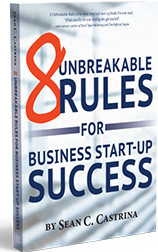Welcome back to another teaching episode! Today we are talking about “What Differentiates Iconic Companies!”
What we’re going to talk about today is what differentiates iconic companies from the rest of the pack. What separates the Amazons from all the other companies that tried to form in the online space? What did they do that was so different? Why is there Netflix but Blockbuster is almost completely gone? You can keep going down the line.
I went to Chick Fil-a yesterday and they were tearing it down to rebuild one bigger with more lanes. Now think how much profit you must be able to make when you can just shut your door for a few months!
So what is it that the iconic companies do. In 1960, of all the Fortune 500 companies, only 11% exists today. So there’s clearly something that iconic companies do that the others don’t.
I’m going to share with you the five things that I have determined are what differentiates them and why some of these iconic companies still exist. I think you’d be wise, if you’re small business owner, to emulate some of these things.
Iconic Companies Have Great Leadership
he first thing that differentiates great companies is their leadership. Great leadership typically creates great companies. When you look at GE during their iconic days, they had Jack Welch. He was voted the best CEO of the entire century. He led them through extraordinary profitable times, as well as IBM.
You have to be a leader. You have to cast the vision. You have to create a vision that other people can get on board with that will differentiate you from your competition.
Iconic Companies Staff at a High Level
Mark Zuckerberg at 23 years old went to a Christmas party where he meets Sharon Sandberg, who at the time was a high level VP at Google, and he speaks with her for about ten minutes and then he has dinner with her and her husband and recruits her to come over to Facebook. She became so instrumental in monetizing Facebook.
Steve Jobs bought on Tim Cook. Tim Cook would later take Apple to a trillion dollar evaluation. Steve Balmer took Microsoft to levels that were exponentially higher than Bill Gates did.
If you can’t bring on leaders and managers where there can be seamless transitions, you’ll never be a great company. The greatest companies just seamlessly turn it over. Jeff Bezos can leave the role of CEO of Amazon and it still keeps going. It’s like a conveyor belt of great leadership in critical positions.
Iconic Companies are Customer-centric
I heard Jeff Bezos talk about how you can never make all your customers happy and the words he used was customer dissatisfaction. His point was, is that they’re always going to be dissatisfied and it’s your job to be ahead of them, to know what they want even before they know they wanted it.
Amazon is about the perfect buying experience. I don’t know where you can order something easier. All you have to do is say “Alexa, I need toilet paper”. Boom, it’s there the next day.
You want to be able to see what your customers want five years from now and ten years from now. You want to be so customer-centric that you know their needs even before they do.
That’s what blockbuster didn’t do. Blockbuster just assumed that people would be happy to stand in line at eight o’clock at night, coming home from work, or that the next day they’d want to remember to bring back the video.
Netflix completely solved things differently:
Send the videos back. When you send them back, we’ll send you new ones. We don’t care when you send them back.
That’s customer-centric.
Iconic Companies Innovate
Great companies innovate and they innovate before it is required for survival. The problem is, is too many companies try something risky at the end of their life. I’s an all-out all in bet. They move all the chips in on this one innovation that they think is going to save their company and then when it doesn’t work, they’re no longer around.
Great companies are constantly innovating. They’re constantly making bets. Not all of them work, but the few that do keep them current and relevant. Where can you make changes? If you go back to number three, the customer-centric point, that would help you with your innovation. If you know your target customer is, you should have an idea of what it is they need. If you have a good interaction with your customers, you’re surveying them, then you know what it is they want. You know what it is they think you’re not giving them. Look at your customer complaints. You can see where innovation and change must take place.
Iconic Companies Have Great Culture
Iconic companies have a culture. When you have that culture that it just permeates everything you do. The culture and your brand, they kind of merge together.
Nordstrom would be a great illustration of this. Their staff is consumed with the customer experience. If you don’t have a culture that believes in and supports your brand, you’re never going to be able to deliver on it anyway, so your brand is going to be disingenuous. Your customers are not buying into that. Only when the culture supports and buys into the brand, then you have something special.

